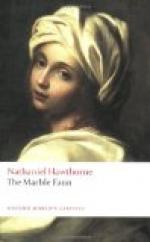They again moved forward. And still, from the Forum and the Via Sacra, from beneath the arches of the Temple of Peace on one side, and the acclivity of the Palace of the Caesars on the other, there arose singing voices of parties that were strolling through the moonlight. Thus, the air was full of kindred melodies that encountered one another, and twined themselves into a broad, vague music, out of which no single strain could be disentangled. These good examples, as well as the harmonious influences of the hour, incited our artist friends to make proof of their own vocal powers. With what skill and breath they had, they set up a choral strain,—“Hail, Columbia!” we believe, which those old Roman echoes must have found it exceeding difficult to repeat aright. Even Hilda poured the slender sweetness of her note into her country’s song. Miriam was at first silent, being perhaps unfamiliar with the air and burden. But suddenly she threw out such a swell and gush of sound, that it seemed to pervade the whole choir of other voices, and then to rise above them all, and become audible in what would else have been thee silence of an upper region. That volume of melodious voice was one of the tokens of a great trouble. There had long been an impulse upon her—amounting, at last, to a necessity to shriek aloud; but she had struggled against it, till the thunderous anthem gave her an opportunity to relieve her heart by a great cry.
They passed the solitary Column of Phocas, and looked down into the excavated space, where a confusion of pillars, arches, pavements, and shattered blocks and shafts—the crumbs of various ruin dropped from the devouring maw of Time stand, or lie, at the base of the Capitoline Hill. That renowned hillock (for it is little more) now arose abruptly above them. The ponderous masonry, with which the hillside is built up, is as old as Rome itself, and looks likely to endure while the world retains any substance or permanence. It once sustained the Capitol, and now bears up the great pile which the mediaeval builders raised on the antique foundation, and that still loftier tower, which looks abroad upon a larger page of deeper historic interest than any other scene can show. On the same pedestal of Roman masonry, other structures will doubtless rise, and vanish like ephemeral things.
To a spectator on the spot, it is remarkable that the events of Roman history, and Roman life itself, appear not so distant as the Gothic ages which succeeded them. We stand in the Forum, or on the height of the Capitol, and seem to see the Roman epoch close at hand. We forget that a chasm extends between it and ourselves, in which lie all those dark, rude, unlettered centuries, around the birth-time of Christianity, as well as the age of chivalry and romance, the feudal system, and the infancy of a better civilization than that of Rome. Or, if we remember these mediaeval times, they look further off than the Augustan age. The reason may be, that the old Roman literature survives, and creates for us an intimacy with the classic ages, which we have no means of forming with the subsequent ones.




